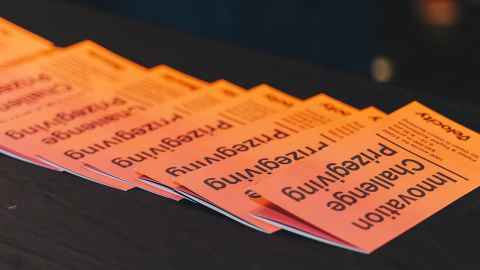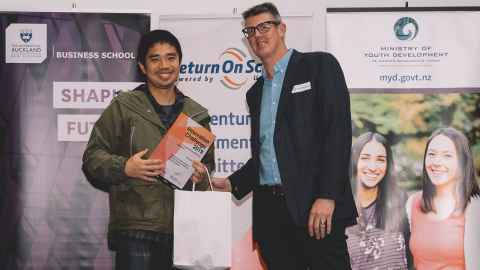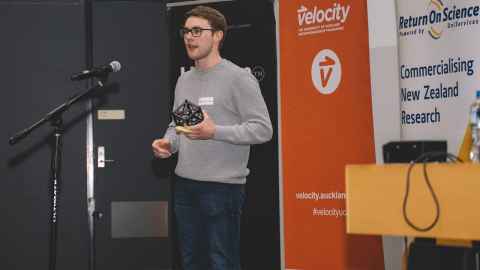Engineering entrepreneurial ideas
20 June 2019
We catch up with some Faculty of Engineering winners from the recent Velocity Innovation Challenge.

Each year, the Velocity Innovation Challenge is held to encourage the University's staff and students to share venture ideas to solve problems. The Faculty of Engineering is well represented in 2019's list of 40 $1,000 prizewinners, with over 15 groups ranging from undergraduate students to academic staff across our different departments. We find out more about their unique ideas and backgrounds, how engineering can contribute to great ideas, and what they are continuously learning about commercialising their technology.
Renoh Johnson Chalakkal
Faculty of Engineering Prize for Cure MyopiaTM
"Cure MyopiaTM is an evidence-based initiative designed to screen, detect and monitor the treatment of myopia (short-sightedness) among children and young adults through the implementation of Internet of Things and smartphone-based application. This system can be implemented in any eye care practice; it helps to identify individuals at risk of progressive myopia, and follows-up with in-house monitoring for side effects and treatment. We're tapping into the field of precision medicine too, with a customised algorithm that provides clinicians with patient-specific guidelines.
"The ultimate goal of Cure MyopiaTM is to cut the global rise of myopia by half. About 27% of the world population are myopic, with an estimated growth to 49% within the next 30 years. Our literature reviews and research additionally show that children of East Asian descent are most at risk, so we have identified this as a group who will benefit from our treatment programme.
"Our three team members include myself, my PhD supervisor Associate Professor Waleed Abdulla, and Dr Hong Sheng Chiong, the CEO of oDocs Eye Care. We were all researching in the same department here at the University, won the 2017 Velocity Innovation Challenge, and were one of the 14 finalists for the 100K Challenge. My supervisor and I connected with Dr Hong – who initially developed Cure MyopiaTM – at one of the Velocity workshops in 2017.
"We've also been collaborating on my PhD on retinal image processing. My research involves the development of retinal image processing algorithms on deep neural networks. These algorithms will successfully pick up information that may indicate the presence of macular oedema and other ocular sicknesses. This new venture is an extension of the engineering expertise I've gained while doing my PhD.
"We missed out on the 2017 100k competition finals, but learned a lot from the experience and worked on overcoming the previous pitfalls. We are more focused this time, and confident that we'll make it to the 100k podium."
Renoh is a PhD candidate in our Department of Electrical, Computer, and Software Engineering
Zhenan Feng

Education Prize for Immersive Virtual Reality Serious Game Emergency Training System
"Our team includes myself, my main supervisor, Dr Vicente Gonzalez, and my co-supervisors Professor Robert Amor from the Department of Computer Science) and Carol Mutch, an Associate Professor of Critical Studies in Education. This makes it a multi-disciplinary project, bringing together computer science, civil engineering, human behaviour, and education. We all bring different perspectives, research methods, insights, materials and resources, which I see as very beneficial in the shaping of our project.
"Dr Gonzalez came up with this idea three years ago – VR has unique features that make it possible to study human behaviour under extreme conditions, and also provides opportunities to train people in virtual environments that are very close to the real world. Although VR has become popular in recent years, we still need to convince people that this technology can bring something new to traditional training environments.
"Our original prototype has been tested in Auckland City Hospital in 2017. We've since developed it further and are planning to test it with various types of people, not only for effectiveness but also for applicability.
"We don't have too much experience with commercialisation, but this competition and entering the 100K will add value and an entrepreneurial edge. For us, it was less about winning the prize, and more for the recognition we got for the quality of this project and its potential of commercialisation. Velocity CEO Nick Goldstein noted in the letter, 'out of hundreds of ideas that were entered into the Velocity Innovation Challenge this year, our expert judges recognised your idea as one of the most outstanding'."
Zhenan is a PhD candidate at our Department of Civil and Environmental Engineering
Misagh Ebrahimpour
AgritechPrize for Remote Agriculture Optimisation
"This is our first time participating in Velocity and we found the new experience to be very valuable. We're learning how the business and marketing sides of solutions are important, and got to connect with people involved in successful start-ups, which is very useful.
"Our idea addresses the problem of irrigation management – the over and under-watering of crops are the main reasons for under-profiting. The solution gives optimum irrigation decisions, which will increase profit by maximising yield and minimising water consumption. We see water management as a global issue that's becoming increasingly important in recent years due to the effects of climate change. In New Zealand, it's led to more draughts, less rain in Eastern regions, and more rainfall in Western regions. We want to mitigate these effects and address the food and water supply for our growing population.
"I met my team when I was studying my masters at the University of São Paulo in Brazil. Since then, we have been collaborating in different projects related to the optimisation of processes. We've been working on applying optimisation techniques to irrigation management for the past two years, but this really started many years ago for me when I was farming in my family garden in Iran. It was located far from my hometown, so I designed and implemented an automatic system rather than going there for irrigation frequently. After that basic framework, I have been thinking about how its performance can be improved.
"My contribution to the project as a chemical engineer is in the optimisation and advanced control of chemical processes. I studied the real-time optimisation of refining processes during my master and my PhD applies this to dairy. This project was very motivating for us as our idea was chosen by experts in agriculture science and technology. Now our objective is to develop our idea further and implement it."
Misagh is a PhD candidate in our Department of Chemical and Materials Engineering
Jonathan Mace

Commercial Category Prize for Kessler
"We are developing an electrodynamic tether - a technology that can be used to deorbit satellites at the end of their lives – to help reduce the accumulation of space junk cluttering Earth's orbits. This is also our prizewinning Mission Proposal Competition entry for last year's Auckland Programme for Space Systems, so we'll eventually deploy a CubeSat into Space to achieve our goal.
"I personally have focused a lot on the mechanical design aspect of our project lately, and it has been interesting and rewarding to be able to apply a rigorous mechanical design procedure to a real-world application, and see it in action. We are starting to build physical prototypes, and I have been able to offer suggestions to the team based on my knowledge of design for manufacture, materials, and manufacturing processes.
"Kessler entered the Velocity 100K challenge last year. The two competitions are relatively similar in what they're asking of you. I see the innovation challenge as more of a stepping stone to the 100K. We submitted an entry again because we saw the challenge as a useful way to get feedback on the validity of our idea form a business point of view, and also to help promote to people what we are doing and why.
"We certainly will enter the $100K challenge again. Our idea has progressed since we first got together, and we have learnt a lot. Last year's $100K win by the APSS's own Zenno Astronautics showed us that New Zealand is interested in Space, and that only motivates us further to try and make a name for ourselves in New Zealand's Space industry.
"Fundamentally, our idea is focused on reducing the risk to our global infrastructure that space debris poses. This isn't a solely New Zealand problem – it is a global problem, and it is something that more people and companies worldwide need to focus on. If we can gain more awareness of this issue, then I see all of this as a huge win."
Jonathan is studying a BE(Hons) in Mechanical Engineering